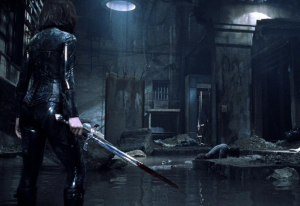Once again, Star Trek: Discovery is proving to be the spiritual successor to Star Trek: Deep Space Nine. During Discovery‘s first season, we noted that its exploration of Starfleet at wartime was an echo of Deep Space Nine‘s Dominion War arc. Discovery‘s second season is exploring one of Deep Space Nine‘s other major themes: faith in a sci-fi universe.
Videos by ComicBook.com
Any fan who kept up with interviews ahead of Discovery‘s Season Two return may have gotten the sense that this would be the case. Showrunner Alex Kurtzman said many times that the season would explore the tension between faith and reason. This exploration would inform Spock’s internal struggles and relationship with Michael Burnham.
The parallels between Deep Space Nine and Discovery were on full display in “New Eden,” the second episode of Discovery‘s sophomore season. In said episode, Discovery continues its mission to investigate the mysterious red signals that appeared across the galaxy. It’s led to a colony of humans who skirted annihilation at the onset of World War III when a being they call the Red Angel took them to another planet.
Cmdr. Michael Burnham disagrees with Capt. Christopher Pike about how they should refer to this entity. Pike, convinced of the being’s benevolence, starts referring to it as the Red Angel. Burnham is reluctant to attach the cultural baggage that comes with the word “angel” to something they do not understand. Burnham wants empirical evidence of the being’s nature and intent, but Pike is more willing to take things on faith.
This wrestling about the power of names recalls similar discussions in Star Trek: Deep Space Nine. At the beginning of the series, Deep Space 9 becomes a hub of activity when a stable wormhole leading to the Gamma Quadrant appears nearby. Noncorporeal, extradimensional aliens live inside the wormhole and communicate with Starfleet Cmdr. Ben Sisko, the officer in command of Deep Space 9.
The devout people of the nearby planet Bajor are quick to apply religion to their understanding of the wormhole, and they refer to the wormhole as the Celestial Temple. The aliens that dwell inside are their Prophets, and they believe Sisko to be the Prophets’ Emissary.
Sisko resists these labels, refusing to accept the mantle of the Emissary of the Prophets. He makes a point of not using the term “Celestial Temple” in regards to the wormhole and refers to its denizens as “wormhole aliens.” He changes his perspective as the show continues and his life becomes more and more influenced by the Prophets. He accepts the mantle of Emissary and begins referring to the aliens within the wormhole as Prophets. There’s a lot of growth and conversation about the nature of the Prophets throughout the show, and it all begins with a Sisko standing on semantics.
Though Deep Space Nine‘s ratings were respectable, they never came close to the heights of Star Trek: The Next Generation. Thus, when it came time to develop Star Trek: Voyager as a replacement for The Next Generation, the show’s producers sought to emulate the episodic format of The Next Generation and The Original Series and return the thematic focus to exploration. There wasn’t time for long arcs ruminating on the power of faith as Voyager moved as fast as possible through the Delta Quadrant. After Voyager, Enterprise also took an episodic approach and concerned itself primarily with being the origin story of the Federation.
More than a decade later, television has changed. In the age of prestige television and binge-watching, there’s more room than ever for the thoughtful, long-form storytelling Deep Space Nine pushed in the 1990s. The conversation around faith has continued throughout Discovery‘s second season. It has informed conflicts between Pike and Specialist Ash Tyler and is at the root of Spock’s troubled state. It’s this ongoing discussion that continues to make Discovery the heir to Deep Space Nine‘s place in the Star Trek canon.
What are your thoughts on Star Trek: Discovery and Deep Space Nine? Let us know in the comments.
New Star Trek: Discovery episodes become available to stream Thursdays at 8:30 p.m. ET on CBS All Access.








